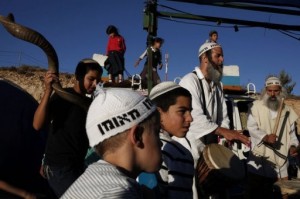
Jerusalem — Israel’s envoys in Paris and London were called in for consultations on Monday as the Jewish state came under huge diplomatic pressure over its settlement activities which the UN chief warned could wipe out peace hopes.
It was the latest in a series of top-level diplomatic protests over Israeli plans to build 3,000 settler homes in East Jerusalem and the West Bank that emerged on Friday with an official source confirming it was payback for the Palestinians winning the rank of a UN non-member observer state a day earlier.
Some of the construction is to take place in a controversial corridor of land east of Jerusalem, called E1, sparking a storm of protests from Washington and Brussels as well as from UN chief Ban Ki-moon, who on Sunday warned it would deal an “almost fatal blow” to the prospects of resolving the conflict.
Experts warn that Israeli construction in E1 would completely block the narrow corridor of land running east of Jerusalem, cutting off the northern West Bank from the south.
On Monday morning, Britain’s Foreign Office confirmed it had summoned Israeli Ambassador Daniel Taub for talks over new settlement plans, shortly after warning it was weighing a “strong reaction” to the proposals.
And in Paris, Ambassador Yossi Gal was also summoned for consultations at the French foreign ministry, an embassy source told AFP.
Earlier, Israel’s left-leaning Haaretz newspaper said the two governments were considering recalling their ambassadors for consultations over the plans to build in E1, which the newspaper said they considered a “red line.”
“This time it won’t just be a condemnation, there will be real action taken against Israel,” a senior European diplomat told the paper, which also quoted another diplomat as saying: “London is furious about the E1 decision.”
Quoting diplomatic sources, the paper said Britain and France were coordinating their moves and had “discussed the extraordinary step of recalling their ambassadors from Tel Aviv for consultations” and with a final decision to be taken later on Monday.
E1 is a highly contentious area of the West Bank that runs between the easternmost edge of annexed East Jerusalem and the Maaleh Adumim settlement.
Palestinians bitterly oppose the E1 project, as it would effectively cut the occupied West Bank in two, north to south, and sever it from Jerusalem, making the creation of a contiguous Palestinian state almost impossible.
The summoning of the two ambassadors came a day after a strongly-worded warning from Ban, saying he viewed the plans “with grave concern and disappointment.”
“This would include reported planning in the so-called E1 envelope, which risks completely cutting off east Jerusalem from the rest of the West Bank,” his spokesman said in a statement.
“Settlements are illegal under international law and, should the E1 settlement be constructed, it would represent an almost fatal blow to remaining chances of securing a two-state solution.”
It followed a protest on Friday by US Secretary of State Hillary Clinton and a strongly-worded statement from EU foreign policy chief Catherine Ashton on Sunday, in which she urged the Israeli government to cancel its plans.
Plans to link Jerusalem with the Maaleh Adumim settlement, which lies some five kilometres (three miles) from the city’s eastern flank, has long been espoused by Israeli hardliners, but were put on hold in 2005 following strongly opposition from Washington.
But they were resurrected last week following the Palestinians’ ultimately successful attempt to win the rank of a non-member state at the UN, dealing a harsh political blow to Israel, which vowed to “act accordingly.”
Israel has also said it would not transfer this month’s tranche of millions of dollars worth of tax and tariff funds it collects for the Palestinians.

